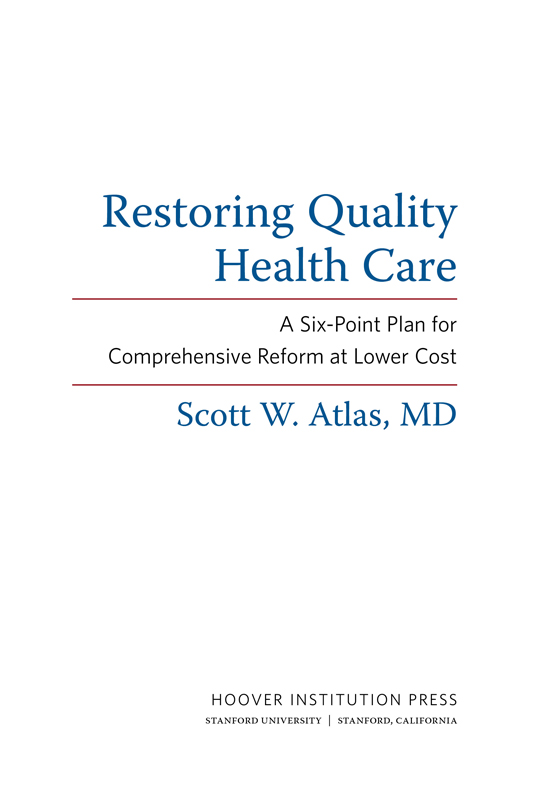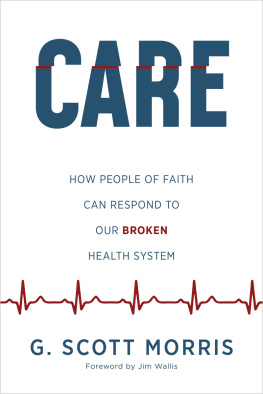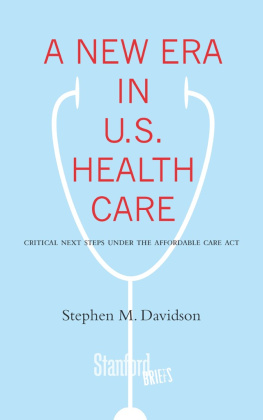Contents
Guide
Restoring Quality Health Care

With its eminent scholars and world-renowned library and archives, the Hoover Institution seeks to improve the human condition by advancing ideas that promote economic opportunity and prosperity, while securing and safeguarding peace for America and all mankind. The views expressed in its publications are entirely those of the authors and do not necessarily reflect the views of the staff, officers, or Board of Overseers of the Hoover Institution.
www.hoover.org
Hoover Institution Press Publication No. 668
Hoover Institution at Leland Stanford Junior University,
Stanford, California 94305-6003
Copyright 2016 by the Board of Trustees of the
Leland Stanford Junior University
All rights reserved. No part of this publication may be reproduced, stored in a retrieval system, or transmitted in any form or by any means, electronic, mechanical, photocopying, recording, or otherwise, without written permission of the publisher and copyright holders.
For permission to reuse material from Restoring Quality Health Care: A Six-Point Plan for Comprehensive Reform at Lower, by Scott W. Atlas, ISBN 978-0-8179-1944-3, please access www.copyright.com or contact the Copyright Clearance Center, Inc. (CCC), 222 Rosewood Drive, Danvers, MA 01923, 978-750-8400. CCC is a not-for-profit organization that provides licenses and registration for a variety of uses.
Hoover Institution Press assumes no responsibility for the persistence or accuracy of URLs for external or third-party Internet websites referred to in this publication, and does not guarantee that any content on such websites is, or will remain, accurate or appropriate.
Cataloging-in-Publication Data is available from the Library of Congress.
ISBN: 978-0-8179-1944-3 (cloth : alk. paper)
ISBN: 978-0-8179-1946-7 (epub)
ISBN: 978-0-8179-1947-4 (mobi)
ISBN: 978-0-8179-1948-1 (PDF)
Contents
List of Figures and Tables
Figures
Tables
Acknowledgments
My sincere thanks go to many of my colleagues and friends, especially John Cogan and Alvin Rabushka, for their helpful discussions and insights.
Introduction
The Affordable Care Act (ACA), frequently referred to as Obamacare, has pushed health care in the United States onto a drastically different, far more government-dominated pathway. Massive expansion of failing entitlement programs, huge new tax burdens, and unprecedented regulatory authority of the federal government over health insurance and the health care industry are now in place. These changes were instituted while ignoring, indeed even doubling down on, the fundamental problems with the existing systemthe perverse incentives that have caused runaway costs and excluded millions of Americans from accessing the worlds best medical care. Simultaneously and with remarkable irony, those countries with the longest experience under government-centralized health systems, including Sweden, the United Kingdom, and others, are increasingly footing the bill to shift patients toward private clinics and outside doctors to remedy their scandalous waits, poor quality, and escalating costs.
Time is of the essence. Years after the initial rollout of the ACA, the American people, the health care industry, and the courts still struggle to navigate the law. Under the new regulatory environment, consolidation within virtually all of the important sectors of health care, including hospitals and physician practices, pharmaceutical companies, and insurers, has accelerated. This is harmful to patients. Further implementation of the ACA will undoubtedly reverse the superior access and outstanding quality of care that distinguish American health care from the centralized systems that are failing the world over. Meanwhile, Americas aging population will increasingly require medical care at an unprecedented level. To meet these demands, technological advances in our emerging era of clinically relevant molecular biology offer great promise for new treatments and breakthrough cures. Yet the current trajectory of the health system, particularly under Obamacare, threatens both the sustainability of the system and the essential climate for the innovation necessary to reach these potentials.
As the ACA proceeds to erode the positives of US health care without repairing the systems most important flaws, it is time for a fundamentally different approach to improving Americas health system. Instead of framing health reform with the traditional trade-off, that is, take away benefits, or raise taxes, my plan centers on a completely different paradigmrestoring the appropriate incentives in order to increase the quality of health care and simultaneously reduce its costs. To accomplish that goal, I propose a six-point, strategic, incentive-based reform plan for US health care. The foundation of my plan centers on highly incentivized, lower-cost catastrophic coverage and universal, significantly expanded health savings accounts (HSAs). The plan transforms the US health care system by instilling market-based competition and empowering consumers while reducing the federal governments authority over health care. It restores the originally intended purpose of health insuranceto protect against the risk of significant and unexpected health care costs. Using specific incentives and detailed proposals, the plan enhances the availability and affordability of twenty-first-century medical care and ensures continued health care innovation. Once this plan is fully implemented, conservative estimates indicate that private national health expenditures will decrease by roughly $2.75 trillion over the decade, federal government health expenditures will decrease by approximately $1.5 trillion over the decade, and access to high-quality health care will significantly improve. These savings will promote increased economic activity into other areas of the US economy. And perhaps most importantly, the health reforms in this plan reflect the key principles held by the American people about what they value and expect from health care in terms of access, choice, and quality.
Before I address the rationale for the proposed reforms necessary to achieve the above goals, we need to understand clearly the current state of US health care. This book will first examine the status of US health care, particularly in light of the ACA, and then delineate key reforms to meet the significant health care challenges facing the nation. Six major reforms are then described in detail, each with its underlying rationale, as follows: (1) expand affordable private insurance; (2) establish and liberalize universal HSAs to leverage consumer power; (3) instill appropriate incentives with rational tax treatment of health spending; (4) modernize Medicare for the twenty-first century as the population ages; (5) overhaul Medicaid to eliminate the two-tiered health system for poor Americans; and (6) strategically enhance the supply of medical care while ensuring innovation.
CHAPTER ONE
US Health Care Today:
Setting the Record Straight
America is facing its greatest health care challenges in history. Unprecedented demand for medical care is a certainty. According to the Department of Health and Human Services Administration on Aging and US Census Bureau statistics, the number of Americans sixty-five and older has increased by a full six million in the past decade alone, to more than 13 percent of the overall population, while those age eighty-five and older have increased by a factor of ten from the 1950s to todays six million ().










